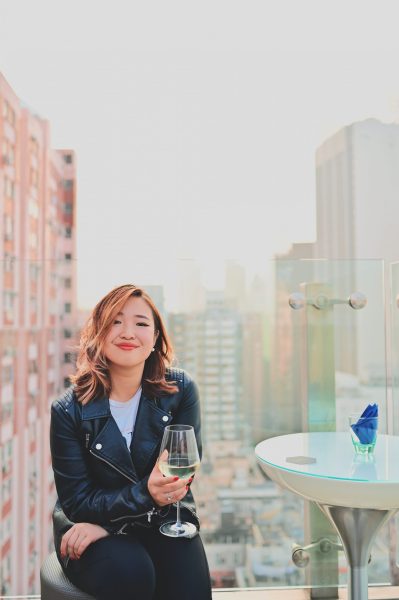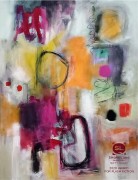On a conceptual level, “Waiting” explores central paradoxes inherent to social media. There’s the desire to somehow maintain privacy and create intimacy through a mass-production model, while also exposing personal moments to the eyes of strangers. There’s also the concern of whether or not the persona shared and exposed is the authentic person, the real person. What motivated you to write a story that explores the philosophical complexities of identity through the vehicle of social media?
There were a few things I’d been juggling for a while—the obsession with influencer culture, the love-hate relationship audiences and influencers have, and the very small, very compressed society that is Singapore, where you basically have three degrees of separation, max. So the idea of digital surveillance, within a society that is always watching, waiting for something to happen. When the world started to go into lockdown, all these concepts clicked into place, especially with the urgent way quarantine brings out the most extreme sides of people. Everything gets heightened when you’re alone, and now solitude is enforced. I simply took an existing sense of pettiness and pushed it.
People have always performed authenticity in social spaces. I’m less concerned with the influencer, which is really just the latest iteration of the performer, as I am the psychology of the audience. When there’s any relationship, there’s always the question of control, power, and with whom it lies. Why do we truly believe someone we’ve never met is a kindred soul? We all know how the entertainment industry works, and how it’s monetized – what kind of willful, continual forgetting do we engage in, when consuming these digital roles?
A lot of these questions originate from my own experience in the media industry. I used to do screen work, and one of the first things my producer said to me was: in movies, there’s distance between the actor and audience. That distance was reduced by TV. Now, people can watch you on digital TV or Youtube; you’re in their homes, in their pockets. That creates a very different intimacy, like it or not. You, and everything online associated with you, have become part of that product. What boundaries do you draw, to protect yourself?
What books, movies, videogames, albums, dynamic concepts, etc., influence you the most?
The writers I admire the most today are James Baldwin, Elena Ferrante, Tash Aw, Penelope Mortimer, Yiyun Li, Chimamanda Ngozi Adiche, Roxane Gay, and Deborah Levy. The list goes on, but if I do, I’ll use up all my words just on my book list!! I’ll give you something else I looked at while working on “Waiting”—anime fan blogs. Fandoms offer a whole other level of scrutiny, a kind of obsessive love blended with a sense of ownership. I spent weeks doing a deep dive into the fan blogs for the anime, Attack on Titan (which is excellent, highly recommend), to see how each world-building or emotional turn was broken down to an almost cellular level by its fans. That creator-audience dynamic was something I found fascinating, because of the episodic way the story is released alongside occasional showrunner/writer interviews, triggering fresh rounds of deep analysis. It’s an energy any writer would be lucky to have, I think, that kind of fevered investment from their readers, but when you transfer that energy to an individual, the shape of that obsessiveness changes.
This is one of my favorite lines from “Waiting”: “It’s okay to feel anxious.” These are crazy times. Obsession with productivity is a product of toxic work culture. Take a moment to just breathe. I love the irony of an influencer who most likely spends eight to twelve hours a day or more producing content guiding a stress-relief meditation and leveling jabs at toxic capitalism. How do you create these subtle moments of irony? Is this a craft goal, or do the opportunities appear, and you seize them?
Because “Waiting” was so compressed, every turn had to work towards two or more things, and having that space of difference was ripe for creating irony. But that particular line wasn’t difficult at all, because it’s so blatant in online discourse. Unless you Thoreau your life away, you’re basically a cog in the capitalism machine, and I don’t know that anyone can divorce themselves completely from that without first possessing an immense amount of privilege. I certainly can’t. The goal is to recognize what’s happening, even if you can’t radically overhaul it in your lifetime, because only when you know what you have to work with can you take a meaningful step in any direction. The irony of Arissa spouting these platitudes is compounded because we don’t know if she’s self-aware of the culture she’s steeped in, we’re watching her online persona just like everybody else. In fact, we’re watching her through the lens of someone who really hate-watches her, someone who views herself as culpable in the birth of this micro-influencer.
I think the most delicious part for me, craft-wise, was using the first person of an ex-best friend. The first person is so wonderfully immediate that you naturally bond with it, and the challenge is manipulating the story against that bond, so that as you go on, you’re like, uh, this is kind of crazy, I don’t know that I want to be stuck in this voice anymore.
Do you use social media? If so, what platforms? What’s your favorite platform and favorite type of content? Bonus points for guilty pleasures.
I love social media. I think it’s incredibly powerful; I’ve leveraged it for work, portfolio, networking, and publicity over the years. My favorite is twitter, which is traditionally the writer’s platform. I don’t dare to download tiktok. I’ve seen what it does. No work gets done!
What writing projects are you working on now?
A very slow, painful redrafting of a novel, and editing a short story collection, which was written entirely in bursts while avoiding said novel.



 The core workshop of SmokeLong Fitness is all in writing, so you can take part from anywhere at anytime. We are excited about creating a supportive, consistent and structured environment for flash writers to work on their craft in a community. We are thrilled and proud to say that our workshop participants have won, placed, or been listed in every major flash competition. Community works.
The core workshop of SmokeLong Fitness is all in writing, so you can take part from anywhere at anytime. We are excited about creating a supportive, consistent and structured environment for flash writers to work on their craft in a community. We are thrilled and proud to say that our workshop participants have won, placed, or been listed in every major flash competition. Community works.